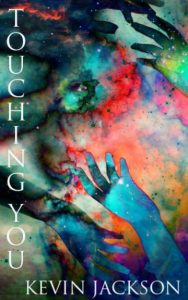An Interview with Kevin Jackson,
Author of ‘Touching You’
by Richard Horton
 Kevin Jackson (pictured left) is the poet behind the collection ‘Touching You’. The book was released at the end of 2016 and is Jackson’s first published collection. It is split into three parts, with each part containing multiple poems that each follow similar themes within their section of the book. Featuring poetry that is unafraid of touching on some difficult to talk about topics, the collection provokes both your thoughts and emotions as you read.
Kevin Jackson (pictured left) is the poet behind the collection ‘Touching You’. The book was released at the end of 2016 and is Jackson’s first published collection. It is split into three parts, with each part containing multiple poems that each follow similar themes within their section of the book. Featuring poetry that is unafraid of touching on some difficult to talk about topics, the collection provokes both your thoughts and emotions as you read.
Recently, I was able to interview Jackson about his collection and get to know some of his thoughts on his work. This is what he had to say.
RH: Was there a particular message that you wanted to convey with this book?
KJ: I have a feeling bards have always served to remind us of who we are, of the tastes and smells of existence, our emotions, our relationships, our wounds, our understanding of place and space and spirit. Our modern world seems so polarised, so fearful. I wanted to remind us that the sense of separation, of apartness begins inside. And that it can change if we reach out even a little further. If, instead of differences, we tune to similarities we have so much to give each other, so much we can create together.
RH: Do you have a favourite poem in the collection? If so, which is it and why do you like it so much?
KJ: My favourite is “Touching you”, which named the book. It weaves together three of my deep themes: music (especially in the form of records), the magic of plant life and the possibility of connectedness, of one-ness, which for me has nothing to do with religion and everything to do with being fully, wonderfully, human.
RH: Was this a collection of previous work or did you write new material specifically for the book?
KJ: It’s mostly a collection of previous work drawn from the last 3-4 years. I’ve been writing steadily for ten years or so but my writing’s been invigorated with the move back to the East Midlands, and the inspiration of its vibrant, diverse spoken word scene.
RH: How difficult was it to put together the collection? Was it easy to choose which poems to include or did you find that to be a difficult process?
KJ: A tough question! It’s my first book so in that sense I had nothing to draw on. A book is not just a bunch of poems and a cover, which is self-evident but the implications are not. Only in the process of putting the collection together did I start to gain an understanding of structure, of narrative. I’d performed many of the poems publicly but sending them, un-defended, into the big world felt very different, and disturbing at some level. There was a lot of material to sift through and stark decisions about inclusion. All in all quite a challenge! Fortunately I’m blessed with good friendships with published poets who provided feedback and encouragement throughout the process. In a very real sense, the book is the result of that team work and I’m beyond grateful.
RH: Was there something that inspired you to write your poetry or is it something that you do just because you enjoy it?
KJ: Both! I write because I enjoy it. I enjoy the heightened sense of life given me by writing and the pleasure of sharing that. And life inspires me. Life in all its richness and muddle and mess. Being queer means I espouse values of openness and acceptance and I believe poetry is a wonderful medium for opening hearts and minds, for allowing glimpses into other stories, for making connections. Oral traditions of story-telling are a social constant across geographies of place and time. It doesn’t surprise me that, as our social and environmental challenges intensify, so too does our story-telling in the form of spoken work, poetry, creative expression of all kinds. Expression gives voice, is empowering, admits laughter and tears equally. To be able to do a little to encourage others to give voice to their experiences is a delight.
RH: Are there any other thoughts on your book you would like to share?
KJ: Yes. Not to look away from painful subjects but to face them, with empathy, with compassion, with “fierce love”. That’s why my book features poems on what some might view as difficult subjects such as hate crimes, acts of terror, mortality. Fear separates. Love connects and there is such healing in connection. To embrace life as a process of enquiry. To seek to value all equally and challenge systems that repress equality, disenfranchise, silence. Above all, to delight in our capacity to tell tales and to know ourselves more fully through them. Thank you.
A poem by Kevin – ‘Playing Us’ – was published in HCE magazine’s most recent issue, Toys & Games. His collection ‘Touching You’ is currently available on Amazon.

 Kevin Jackson (pictured left) is the poet behind the collection ‘Touching You’. The book was released at the end of 2016 and is Jackson’s first published collection. It is split into three parts, with each part containing multiple poems that each follow similar themes within their section of the book. Featuring poetry that is unafraid of touching on some difficult to talk about topics, the collection provokes both your thoughts and emotions as you read.
Kevin Jackson (pictured left) is the poet behind the collection ‘Touching You’. The book was released at the end of 2016 and is Jackson’s first published collection. It is split into three parts, with each part containing multiple poems that each follow similar themes within their section of the book. Featuring poetry that is unafraid of touching on some difficult to talk about topics, the collection provokes both your thoughts and emotions as you read.
